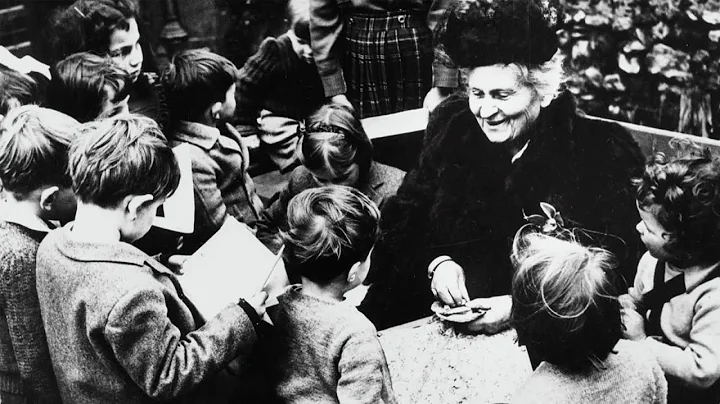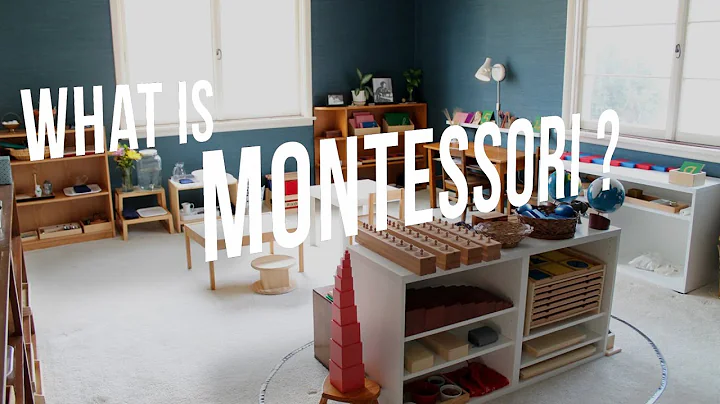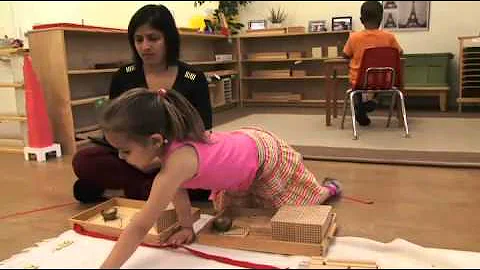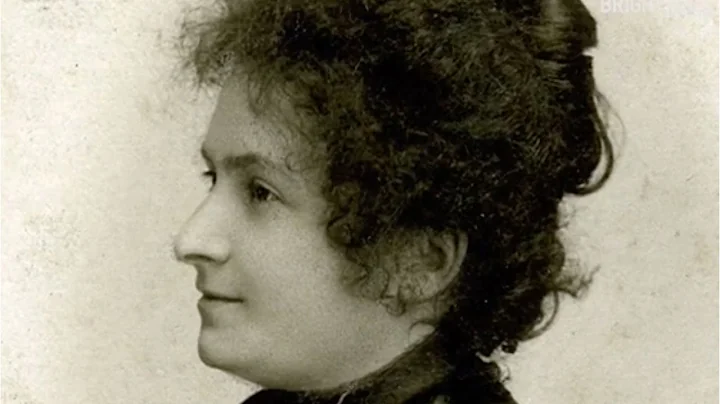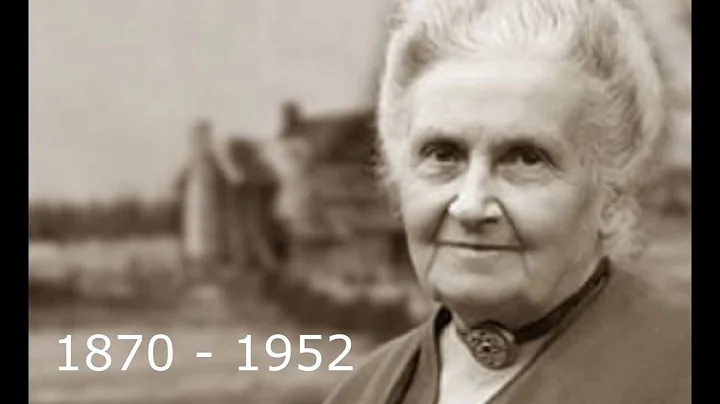Many friends must have heard about the charm of Montessori education like me. In order to learn more about the source concept of Montessori, I concentrated on borrowing:
- " Discovering Children "
- "The Secret of Childhood" [This article focuses on sharing , Recommended reading]
- "The Absorbent Mind" [Partial sharing of this article]
- "Discovering the potential of children" [Partial sharing of this article]
- "The Natural Law of Children" (Faselina Alvarez, Montessori Department Recent works)
Among them, the most recommended reading is "The Secret of Childhood". The other two books involve teaching order and the use of teaching aids. The content is relatively professional and may be more suitable for teachers engaged in early childhood education. The book was borrowed from the library. The version is as follows:

Many of us are familiar with the name Montessori. From the picture, she is a very attractive woman:

And when reading her writing , although it was written nearly 100 years ago, the lines still contain shocking insights and a humble and peaceful personality ("The Secret of Childhood" was published in 1936).
Maria Montessori is a doctor of medicine. She initially came into contact with the research and treatment of a group of children with intellectual disabilities, and achieved amazing results ( children with intellectual disabilities under her supervision passed the National Reading and Writing Test for Normal Children ). In 1907, she opened the first "Children's Home" in San Lorenzo, a slum in Rome, and admitted about 50 children from poor families. Under her unique teaching methods, after a few years, these ordinary poor children Children's minds have undergone tremendous changes, and each of them has become independent, confident, self-disciplined and well-educated.
To be honest, there are several reading points in the book that ordinary readers may encounter:
- slightly touches on religion (it seems that she has faith), but it can be regarded as a beautiful poem or spiritual conversion. It is not far-fetched;
- has rich practical experience in extensive contact with young children. We usually deal with a small number of children. It is difficult to imagine how equality and fraternity she has as an educator, without prejudice, and The challenge of seeing every child (and their mind) in a specific way is not certain of a particular teaching experience, and the touching moments of certain chapters, those of genuine respect for children, are awe-inspiring ;
- As mentioned previously , Montessori has formed a more systematic teaching method, involving teaching principles, application details, etc., which are relatively professional (reading, writing, mathematics, etc.)
When we were watching the movie " The Journey of the Soul ", there was a detail that said, I have met many mentors with great personalities on the 22nd, so will we be curious about why some mentors are said to have great personalities? The secret lies in their flowing words. In my reading in the past few years, there are several authors and their works that have deeply moved me:
- Adler "Inferiority and Transcendence"
- Françoise ·Dordo "The Interests of Children - Learn to Respect Children"
- Montessori "The Secret of Childhood"
- Fromm "The Art of Love"
- Fei Xiaotong " Native China "
Among these works, there are Very stable insight , to a certain extent, is sharp, and the insight often goes beyond what others say; it may not necessarily make readers feel flawless, but is very real, the words come from the heart, and the words have meaning. Among them, these authors seem to have a calm demeanor, and it seems to be a kind of faint "selfless" state, or in other words, there is no personal grudges in the text, and they serve more of their own thoughts and wills. wait.
Yes, there is an attractive heart behind the words.
Then, it is not difficult for us to understand why Montessori's "The Secret of Childhood" has something that touches people's hearts - in Somerset Maugham's work "The Veil", it describes a woman who was ravaged by disease. The combination of the noble soul and simple demeanor of the European aristocratic nun and her colleagues who insist on rescuing abandoned babies transcends language and constitutes the influence of charity itself. After reading for a long time, the hero and heroine in the book may have quietly disappeared, but the nun's magnanimity and cross-racial spirit are always there like a stable and gentle background.
I would like to say that in reading "The Secret of Childhood", you can get a glimpse of that kind of selfless and compassionate soul. Of course, we know that sometimes this is more dangerous on Zhihu , and you may be educated to a fault by some comments, hahahaha - but what we can know is that when those hearts insist on loving-kindness, they also I have encountered challenges and difficulties^^, and they are great challenges and difficulties.

Picture source: Childlike Child Care Center
. The primary responsibility of an educator is: to activate life, but allow it to develop freely
It is the kind of true love and respect that discovers and awakens the hearts of children. This is what I read The biggest realization after reading Montessori books. Montessori is modest. She confessed in a small example in the book: I made a mistake at this time. When she was observing the teacher's class, she did not skip the level to instruct the teacher, but quietly observed.
But when true love is there, everything becomes different because there is true honesty, understanding and acceptance. The reason why kindness makes everything different is that the understanding of life is different from the origin. Children can feel and capture this sincerity precisely because they come from a clear source - the discussion of rewards and punishments in the book can The masters I read above have similar explanations: praise and criticism are unnecessary.
All human victory and progress originate from some inner impulse.
If a young student chooses medicine as a career out of interest and studies hard, he may become a good doctor. However, if he chooses medicine for the purpose of inheriting the family business or entering into an ideal marriage, or because of the temptation of other external interests, he may become a good doctor. If he makes this choice, he will never become a real doctor.
If a young person has to be punished or rewarded by school or family before he is willing to study, then he had better not get this degree. Everyone has a special aptitude or a specific professional endowment. It may not be eye-catching, but it must be useful. Rewards may lure individuals away from their innate talents and into wrong behaviors. p.13-14 "Discovering Children's Potential"
may also be used as a reading for young teachers to check whether they are willing to devote themselves to education:
In view of this, we need to think about: children are forced to grow up in such a man-made adverse environment, so as to As for the deformed bones, what impact will it have on their minds? ... We understand very well that when a person's blood and sweat are drained and his body functions become disordered, he will definitely feel depressed and heavy inside, to the point of numbness. …The spirit longs for salvation far more than the body does. ...
We are all too familiar with this regrettable scenario: in the classroom, the teacher is busy chattering away knowledge into the minds of the students under his charge. In order to successfully complete this task, he must force the students to stay still and concentrate, and make full use of rewards and punishments to force them to concentrate.
However, frankly speaking, rewards and punishments are "mental desks" and tools of mental slavery. They are more likely to cause deformity than prevent it.
In fact, rewards and punishments are used to force children to obey the rules and precepts of the world, which is not in line with the natural laws of human nature. These rules are often set for children by adults with unlimited authority.
...
As teachers, what we have to do is not to turn ourselves into children, but to know how to awaken those "people" sleeping in the hearts of children.… What we call encouragement, comfort, love, and respect actually come from people’s hearts. The more generous one is in this regard, the more one can restore and uplift life around them.
The goal of our early childhood education should be to help them develop, not to instill a culture in them.

Picture source: Childlike Childcare Center
. Respect children's inner order, awaken rather than transform
Because of the in-depth understanding of children's inner order , Montessori education also has a very different definition of discipline ("no People can learn self-discipline only by "listening to others"), what is sought in teaching is active discipline: When a person becomes his own master and can restrain himself when he must abide by the rules of life, we call it Observe discipline . Montessori encourages children to work towards the correct goals in their hearts, cultivate children's observation skills, and reduce inappropriate human interference, and cultivate willpower through voluntary practice and non-compliance What is inappropriate. What about human interference? In addition to the well-known discussions of destroying and disturbing children's concentration, there is also a kind of "useless help" , which comes from adults who cannot tolerate children's slow movements and cannot help but intervene or "replace" them. This becomes the source of all initial mental "repression" and it is from this that adults inflict the most dangerous damage on children. Well, in layman’s terms, it is a common arrangement in our lives, treating children as puppets, and even continues to control adult children’s career choices, spouse selection, lifestyle choices, etc. Roll your eyes ~ (The essence of life is...repetition?)
The problem now is that we are very disgusted with the control and arrangement when we grow up (because grown-up children have the power to express and resist openly^^), but we think Children have to be "taken care of" and "helped" by others - doesn't he know how? Spread your hands ~ Reflection ing

Picture source: Tongxintongyu Nursery Center
. Montessori education divides children's training into two goals: :
- Biological goal: Promote the natural growth of individuals.
- Sociological goal: to prepare individuals to adapt to the environment.
For us ordinary parents, it can be understood as "biologically". We need to objectively learn the cognitive development rules of children, so that there will be no unnecessary staged anxiety and panic - is it normal for a 2-year-old not to recognize colors? Is it normal for a 3-year-old to not be able to write? You can find the approximate reference range when reading scientific parenting books.
While respecting the biological characteristics of children, they also consciously carry out some necessary behavioral norms, pay attention to the development of their souls and potential goals, and make them consistent with the social environment and general norms - it is enough to relatively stimulate the good side. But as discussed in the second point, adults should realize that they are not the shapers and builders of children’s psychological lives, but rather let nature take its course on the basis of full respect for children’s spirituality (this is indeed very difficult to understand and master, so many Parents become obstacles to their children’s growth).

Picture source: Childlike Childcare Center
 . To parents: "How do you treat the child I entrusted to you?"
. To parents: "How do you treat the child I entrusted to you?"
Montessori believes that a newborn is not simply a moving body, but also a living body. The spiritual embryo has hidden psychological instructions.
Human behavior is not dominated by established instincts like animal behavior. It is a very free space that needs to be specially created. Everyone develops and grows in self-creation, so it is unpredictable, and the process is complex, difficult, and difficult to touch. . There are, therefore, secrets in the inner soul of children which we would not be able to understand unless they gradually reveal them to us as they grow up. ...
Therefore, only children can reveal the "human natural map" to us.
However, every creative process from scratch is delicate. Children's psychological life needs to be protected and needs an environment just like nature protects biological embryos.
Adults (parents, teachers) who are close to children play a decisive role in young children, and children will be suppressed by adults. Excessive and inappropriate suppression becomes the root cause of adult psychological disorders. Adults often obliterate children's individuality with their self-righteous enthusiasm, love and devotion.
And in order to save children from the dangers of spiritual life, the first step that needs to be done is: to change adults.
Man's highest spirit, that is, the creative and guiding spirit, depends entirely on personal ability, a supernatural ability above nature. This is the original question that one should consider. In order to open the way to the world, the human soul and spirit must be fleshed into human beings. This is the first chapter of a baby's life.
Montessori and Dordo both have embarrassing observations on the point where adults regard babies as large toys:
We like delicate and lovely children, and regard children as toys in our hands, only for Their physical health is taken good care of, but they have another side , and we must give children the greatest respect.
In other words, in Montessori classrooms, precisely because the other side of children is fully respected, they show the amazing side of children - the development of Montessori in China has seen many improvements integrated into the community (... ), even so, in Montessori classrooms, we see far more free children than in traditional classrooms where they are forced to sit in rows and are restrained.
When reading the original work, you can find two things: 1) Even under the guidance of Montessori when she was still alive, when children's homes expanded their popularity, many teachers still could not grasp the essence of Montessori education; 2) Really The Montessori method has a shocking power that touches the soul. After random modifications, it becomes formalism, and it only loses its shape but loses its spirit.
Let me give you a small example from the book to help you understand. A teacher teaches children to recognize squares. He vividly points to each side and each corner and tells the children that this is a square, these are its sides, and these are its corners. Montessori corrects the teaching after class and tells the teacher that you are teaching the child a geometric concept beyond his or her age, rather than teaching him about squares. The child will be confused and the teacher will say that the two are the same. Montessori said that it is different. Children see a square object and recognize its name as a square. They can see and feel it with their eyes, and there is no need to distract them from distinguishing the edges and corners (to the general idea).
I’m really not good at retelling it. Having worked with Xiaopi on several “Mobby Loves Mathematics” books, I admire Montessori’s in-depth observation very much. If there were such a teacher, there wouldn’t be any surprises. No wonder the questions are not in line with children's cognition - oh, so I want to say something else: Under normal circumstances, parents should not help young children with homework, because adults who have not carefully observed children actually do not understand children's thinking. (Go! Okay).

Picture source: Childlike Child Care Center
. Adults’ hidden psychological precautions against children
This book can be said to be a psychology work that is biased towards psychoanalysis (an unprofessional sigh), so let’s go directly to the original text:
Children reach out their little hands to objects for the first time. The impulse to use their hands represents "self" efforts to understand the world, and adults should be full of praise. However, adults "fear" their little hands reaching out to the worthless and irrelevant things around them, assuming the attitude of protecting these things from children.Adults will irritably keep repeating: Don't touch, just like constantly repeating: Don't move, don't talk!
This kind of irritability reflects the dark side of the adult subconscious, which gradually becomes defensive and even hopes for the sympathy of others, as if they are secretly fighting against a force that wants to break their comfort and damage their property.
In order for children to see and hear, that is, to obtain the initial necessary psychological shaping elements from their surrounding environment, they need to possess these elements. When children move for psychological shaping and use their hands to work, they need something to grasp from the outside. That is to say, they need factors to carry out activities in the external environment. However, the home environment does not take into account the needs of children. The items around children belong to adults and are used by adults. These items are prohibited for children and have become "taboos" for children. Banning touch deprives children of their vitality in childhood development.
further metaphors a child who catches a prohibited item that he is not allowed to take, like a puppy that hides in a corner and chews bones. On the one hand, it still absorbs as much nutrition as possible, but on the other hand, it is worried that someone will take it away.
Oh my God! Think of the kids grabbing their parents’ cell phones. (Speechless meditation on the forced modern lifestyle - parents are swallowed up by glowing screens, and children want to imitate their parents...)
Let's continue to look at what is in-depth observation and understanding (about [Imitation]) :
Children's shaping activities are not motivated by unorganized and reckless impulses... Children's activities are therefore linked to a variety of family and social environments. ...This common situation is called imitation, but children's imitation is not immediate reaction imitation... Children's shaping activities come from the overall psychological activities based on cognition. Their psychological life is instructive, and psychological activities always precede actions. , the two are related to each other. That is, when children want to act, they already know what they want to do, and they want to do what they already know, that is, what they have seen others do.
Picture source: Children's Heart and Children's Language Nursery Center
. Be wary of children’s reliance on adults and laziness that is not easily noticed by adults.
. Eliminate the psychological concepts that hinder our understanding of children and our own limitations as adultsGive up autocracy.
While not suppressing your own psychology, abandon the psychology of anger and arrogance (among the two, anger is the most important shortcoming, but it does not mean tangible rough behavior; arrogance puts a charming mask on anger) , a coat of self-respect, even demanding respect from others):
We are psychologically easier to accept and voluntarily correct the mistakes we recognize, but it is difficult for us to accept lessons from others and feel it is a shame. . It makes us feel more ashamed to listen to others' lessons than to make mistakes ourselves. When we have to correct our behavior, we are always trying to maintain our worldly dignity, pretending that we have no choice. One of the most common little disguises is that when we can't get , we will say "I don't like" . We are fighting, but uses this small disguise to resist instead of improving ourselves . Because in struggle people need to organize, individual causes are strengthened in collective struggles. Those who share the same shortcomings instinctively support each other and find the strength to unite.
Dear friends, if you have read this long article, you may also be looking for the power of unity^^ (Are we bad bugs or "just" Smurfs?), hahaha (there is another way to see others Do you have the same "shortcomings" as yourself and feel particularly irritated - because there is a part of you that you cannot accept? ^^)?
Oh, it took me a long time to figure out the real desires in my heart. How about you?
This paragraph is excerpted separately because it is written too...directly - People are affected by subtle psychological effects to disguise and cover up their own status . Some friends may say, how can we improve ourselves? It’s harmful! I write about this on Zhihu every day, and there are always comments saying that it is chicken soup. I originally thought that chicken soup is not bad, at least it is made from chicken. If nothing else, it has a lot of fat content. But the other day, a friend said that chicken soup is full of fat. It's chicken essence... Well, read more, there are all kinds of chickens drawn in the book.
And the impact of our unimproved self on children, because they cannot protect themselves, have difficulty understanding us, they accept what people say about tasks. So not only do children suffer harm, they even feel that when we blame them, they are wrong.
Children cannot rationally understand this injustice, but they can feel it mentally, and thus become depressed and distorted. Children's reactions, such as shame, lying, willfulness, unreasonable crying, insomnia, and excessive fear, all represent a subconscious state of children's self-protection, because children's reason cannot allow them to judge what truly exists in their relationship with adults. s reason.
Perhaps the average parent and educator is not exaggerating, but try to put in place the severely abused children in the news. Tears welled up in my eyes: it was impossible for them to understand this injustice through reason.
Try to sort out the limitations of adults in order to provide the help that children need: these do not mean that we should indulge all children's behaviors, completely abandon the judgment of children, and ignore the intellectual and emotional development of children. On the contrary, educators should always keep in mind their mission, which is to educate.
Picture source: Childlike Child Care Center
Montessori bluntly said that families with many children are better at raising children than families with only children, because the children have mutual understanding. playmate. She also observed that a child one or two years older would teach a thing in a way that was easier for the younger child to understand—that is, children were sometimes better at teaching younger children than adults.
Xiaopi learned to skip rope, and the neighbor’s brother and sister came to teach him. The girl said, you heard the sound of the rope (hitting the ground) and your feet started to jump. Wow, this technical point is so accurate, Xiaopi learned it immediately. Teaching rope skipping to adults is tedious, starting from the basic movements. For children, they have to cooperate with great patience to complete a class. Xiaopi, who is more than 5 years old, can persist for 60 minutes, and the teacher has to continue After adding three more rope-swinging movements, Xiaopi burst into tears: Three are too many, 55555. It’s not Xiaopi’s fault, because for the past 60 minutes, he has been using one movement to throw the rope with his arms. To be honest, I definitely can’t swing for 60 minutes. I don’t have to think about it. My arms are already sore, so the get out of class is over. The three additional ones were the last straw that broke the camel's back.
But Xiaopi has always been very happy when the little brother and sister taught him how to skip rope, because the child can really understand the child better.
Picture source: Childlike Child Care Center
Montessori observed that there is a kind of obedient children who rely on adults in clever ways:
They are like little pitiful people, their vitality seems to depend on other people, and they ask adults for help. , hoping that adults will play with them, tell them stories, sing for them, and never leave them. In front of these children, adults become slaves. An implicit mutuality secretly connects adults and children, but on the surface it makes people think that they understand and love each other. It is these children who keep asking why, but if one looks closely, one will find that they do not listen to the answers but continue to ask questions. What appears to be intellectual curiosity is actually a means to entangle others because they need others to sustain themselves.
They are willing to carry out activities for others and obey any adult prohibitions. Therefore, adults can easily replace children's will with their own will, and children are happy to accept it. This creates a huge danger of falling into inertia. This inertia may be called laziness or laziness.
Laziness is depression in the spiritual world. It is like a decline in physical fitness or a serious illness. In the spiritual realm, it is a decrease in vitality and creativity.
The adult refuses to accept the child's mind and replaces the child. Adults do not realize that they are blowing on the children's spiritual light with useless help and suggestions, and eventually extinguishing it.This is also a serious psychological deviation . The methods I can think of are:
- Conditions allow to have more children, (maybe) naturally break some of the doting and excessive attention (dense fog)
- Prevent doting and domination
- Let them play with peers of the same age (without adults present) Coordinated peer friendship is real play)
This point is singled out because in the current parenting environment, vigilance is very much needed. Of course, we need to understand that this is not inconsistent with advocating parent-child companionship and love for children - not doting on children does not mean ignoring/not loving or caring, right?
This is not a review based on the overall Montessori concept (non-professionals, or those with teaching needs). It only discusses a few points that touched me (an ordinary parent) during the reading, but of course we Understand that Montessori education as a whole concept also observes and practices Coherence of behavior:
Coherence of behavior is achieved almost automatically, no more prompting is needed, just like breathing does not require thinking, we are not aware of the beating of the heart Same.
Children need to build this foundation, but they can never make an action plan for themselves, because they will be disturbed a lot by adapting to the lives and will of adults - In children's environment, there are always powerful people of one kind or another. When arranging children's lives, they never discuss with them and do not pay attention to them, which makes children's behavior seem to have no value.
The book gives an example of a wealthy father who does not allow his children to touch the glass. If a servant/guest breaks the glass, the father will say that it is okay; but if the child reaches out, the father will stop him because he is worried that the glass will be broken. He seems to think that the child is the only person in the family who poses a danger to the surrounding objects, and is also the only person who cannot touch the objects. He is an incompetent person, and is worth less than the objects - don't argue about whether the child should be allowed to hold the glass. It restores the psychology of children's perspective. Few of us can truly experience the world from the perspective of children..
There are many more unique insights into lies, inferiority, possessiveness, etc. in the book, so I won’t list and discuss them one by one. How do you create continuity in parenting?
is basically an in-depth understanding of some concepts. It doesn’t matter which channel you get it from. :
- The simple philosophy of life happens to be in line with the principle of simplicity
- Humanistic philosophy
- Observation and reflection from my life experience
- Educational Psychology Learn
- Child Psychology
- Developmental Psychology
- Some kind of better parenting philosophy
- Some kind of belief
We know that many things are interlinked or overlap. When we have the opportunity to meet people from all over the world, we may even find that some of the qualities that different ethnic groups appreciate are the same.
We look for overlapping voices in reading, voices that inspire us. Learn some new ones and swallow some old ones.
About Tongxin Tongyu
Tongxin Tongyu, a practitioner of high-quality childcare services, a cultivator of professional international teachers, and an advocate of scientific family parenting!
Tong Xin Tong Yu is a child care center built by many domestic and foreign infant and child educators. It is committed to creating a professional environment suitable for the development of infants and young children and supporting the healthy physical and mental growth of children. Provide regular lectures to parents to disseminate scientific parenting concepts and methods. At the same time, it is also a base for teaching demonstrations and teacher internships. Its purpose is to provide more community day cares with high-quality education and teaching demonstrations and teacher training. We have devoted ourselves to creating a multi-level and mature teacher training system, with special emphasis on teachers’ practical work ability. Since its establishment in September 2016, Tong Xin Tong Yu has 4 physical kindergartens in Beijing, covering community day care, corporate day care, commercial sports day care, kindergarten and child care integrated models.
Childlike Heart and Childlike Language Demonstration Day Care is a Montessori model day care built by infant and toddler teachers. It is a model day care of the AMS American Montessori Association Teacher Certification Training Center and an AMS member school. Childlike Heart and Childlike Demonstration Day Care adopts Montessori teaching, which is child-centered and respects children's nature and primitive power. The environment is clean, safe, friendly and tolerant. No matter which class type, it has a sense of beauty, design and order. In an environment prepared by teachers, children can choose their own work, explore freely, and learn spontaneously and actively.
The goal of childlike innocence and children's language in cultivating children is to cultivate their inner self and expand their outer self. Cultivate children to become the best version of themselves. They not only have a good cognitive level, but also have optimism, independence, self-confidence, studiousness, tenacity and problem-solving abilities. and other valuable non-intellectual qualities; outreach: Cultivate children to become useful members of society, acquire courtesy, empathy, cooperation and behavioral norms, so that children can happily integrate into society and become a positive social person.



